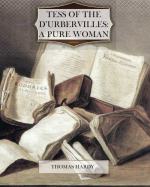|
This section contains 762 words (approx. 3 pages at 300 words per page) |

|
Chance, Coincidence, and Fate in Julius Caesar, Tale of Two Cities and Tess of the d'Ubervilles
Summary: This essay links "Julius Caesar" by William Shakespeare, "A Tale of Two Cities" by Charles Dickens, and "Tess of the d'Ubervilles" by Thomas Hardy through the topics of chance, coincidence, and fate.
Chance, coincidence, and fate play a major role in the literature Julius Caesar by William Shakespeare, A Tale of Two Cities by Charles Dickens, and Tess of the d'Urbervilles by Thomas Hardy. These three factors influence the plot and the characters of these works of prose. All three of these are famous for their chance, coincidence, and fate.
The role of fate is extremely prominent in the drama, Julius Caesar. Three people in the novel have a sense that something horrible is going to happen on the Ides of March. The soothsayer is the first to warn Caesar of the fifteenth of March. "Beware the Ides of March" (Shakespeare 26). The soothsayer also has a discussion with Portia. However the discussion between Calpurnia and Caesar is the final warning to Caesar. Calpurnia's dream causes her to believe the soothsayer. She attempts to convince Caesar to stay home from the...
|
This section contains 762 words (approx. 3 pages at 300 words per page) |

|


